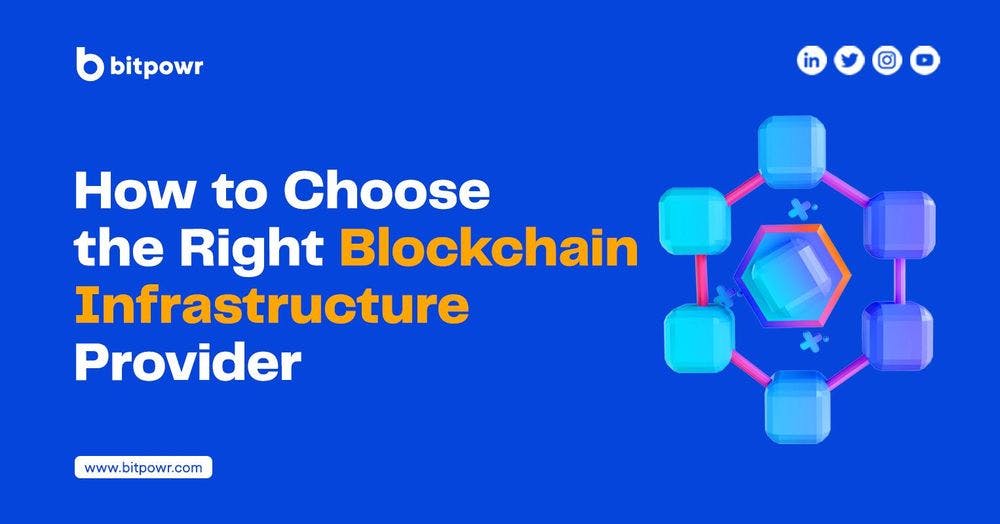Digital asset businesses, such as cryptocurrency exchanges, token issuers, and even financial institutions that want to provide digital asset wallets and other services to their users, require a secure and reliable blockchain infrastructure provider to help manage their operations. But choosing the right provider can be a challenge, as there are many options to consider, each with its own set of features, advantages, and disadvantages.
In this article, we will outline some of the key factors that digital asset businesses and financial institutions should consider when selecting a blockchain infrastructure provider.
Factors to Consider when Choosing a Blockchain Infrastructure Provider
1. Security
Security should be the top priority for digital asset businesses and financial institutions, as they hold and manage large amounts of valuable assets on behalf of their clients. The provider’s security measures have to be extensive and reliable enough to prevent unauthorized access and other cyber threats. Common security features to look out for include multi-signature wallets, multi-party computation, two-factor authentication, and encryption protocols.
The provider’s security measures should also be regularly audited by reputable third-party security firms to ensure that they are effective and up-to-date.
2. Scalability
Another critical criterion is scalability. Digital asset businesses and financial institutions need to ensure that their blockchain infrastructure can handle large volumes of transactions and support the rapid growth of their client base.
As such, their choice blockchain infrastructure provider should have a proven track record of delivering high-performance, scalable solutions that can handle increased demand and should also have the ability to upgrade their infrastructure as needed to support future growth.
3. Compliance
Businesses offering blockchain-powered financial services have to comply with various regulations and laws, such as anti-money laundering (AML) and know-your-customer (KYC) requirements to avoid sanctions and fines.
Choosing a compliant blockchain infrastructure provider will also help financial institutions and digital asset businesses to build trust with their customers, investors, and regulatory bodies. With compliance in place, these organizations can demonstrate that they are committed to following regulatory requirements and best practices to prevent fraud and financial crime.
Going by the listed benefits above, a financial institution’s preferred blockchain infrastructure provider should have a strong understanding of these regulations and should be able to help their clients meet these requirements by providing the necessary tools and processes.
4. Interoperability
Digital asset businesses and Financial Institutions should consider blockchain infrastructure providers that support multiple blockchains and cryptocurrencies. This will enable them to expand their offerings and increase their flexibility in response to market demand.
The provider should have a deep understanding of different blockchain technologies and should be able to support the integration of new assets as needed.
5. Customer support
Businesses often require a great deal of support to kick off and continue their operations on the blockchain. This is why the provider’s customer support should be responsive, knowledgeable and available to help resolve any technical or operational issues. The provider should also offer training and resources to help their clients get the most out of their blockchain infrastructure.
It’s important to consider this factor when making a decision because the quality of the provider’s customer support can have a significant impact on the overall success of the digital asset business or financial institution.
6. Cost
Digital asset businesses and financial institutions should consider the costs associated with using the provider’s services, including initial setup fees, monthly or annual fees, and any additional costs for premium services or support. The provider should be transparent about their pricing and should provide a detailed breakdown of all costs.
Digital asset businesses should also consider the long-term costs associated with using each solution, including any potential price increases or hidden fees.
7. Reputation
The blockchain sector is still maturing; as such many innovators and builders are still trying to figure out a lot of things. This is why it’s important for digital asset businesses and financial institutions to opt for only reputable and trusted blockchain infrastructure providers.
The choice provider should have a strong reputation in the industry and should be trusted by other businesses. If possible, the provider should have verifiable references and reviews from their clients that attest to their proficiency. This will give the digital asset business or financial institution a better understanding of the provider’s strengths and weaknesses and help them make an informed decision.
The provider’s involvement in the industry, such as attending conferences and events, and their reputation within the wider blockchain community, should also be taken into consideration.
Wrapping Up
Choosing the right blockchain infrastructure provider is a critical decision for digital asset businesses and financial institutions. By carefully considering the factors outlined above, businesses can ensure that they select a provider that will help them operate securely and efficiently, and support their growth and success over the long term.
Bitpowr ticks all the outlined boxes. From offering a unified ecosystem of blockchain solutions at competitive prices to delivering wallet solutions protected by iron-clad security measures, we understand what digital asset businesses and financial institutions require to succeed on the blockchain. Let’s chat about how we can help you today.




